Reviving Hail, Caesar!
*Spoilers follow*
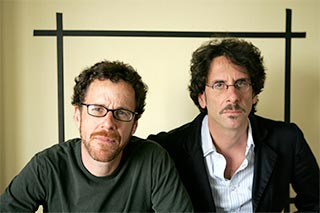
I haven’t the slightest clue whether or not the Coen brothers subscribe to Shakespeare’s idea that, “Brevity is the soul of wit.” But even if they don’t, it appears that with each successive film they manage to prove the truth behind that statement and its value to the art of storytelling.
While their films have quite accurately been described as being perplexing, quirky, and bizarre, there always seems to be a kernel of wisdom at the center of them that makes the experience not just worthwhile, but fulfilling. Raising Arizona, for example, is about as zany a spectacle as anyone will ever see; it’s more or less a live-action cartoon. Yet the moral of the story isn’t goofy at all; in fact, it’s about the only serious thing in the entire movie. Sometimes life’s pains must be endured, and stealing from others won’t alleviate them, but instead make them even harder to bear. The best thing you can do is take a breath, “sleep on it,” and see what you can do to improve your lot in life (I don’t want to go spoiling the movie for those of you who haven’t seen it, so I apologize for the lame synopsis).
Fargo also has a lovely little message. Life isn’t about obtaining extravagant things, or indulging our selfish passions, but dedicating ourselves to that which betters us, mainly to family life and friendship with our neighbors.
Come to think of it, the Coens’ movies aren’t the only peculiar things about them. They themselves are a bit of an oddity in the filmmaking world seeing as how they are some of the only storytellers who offer morals in their movies and don’t rely on witty writing or clever camerawork (though those things are certainly present in their films) to supplant the meaning of their films.
For example, The Hateful Eight is an absolute blast from start to finish. But what sticks? What’s the message? Do whatever it takes to survive?
How about Mad Max: Fury Road? While I’m convinced that it is probably the most spectacular movie to have come out in the last few years, there’s not much in the way of morals. Strive for justice, even in a world gone mad? Sure, that’s a decent lesson, and decent folks will get behind it, but a person would have to get a perfect 10 in mental gymnastics in order to make and prove the claim that Mad Max is somehow a transcendent film that illuminates and examines the human condition. It’s just an action movie. A fantastic one to be sure, but just an action movie all the same.
This is also a problem that pervades movies that try to be thoughtful, but end up being too clever for their own good. The Revenant was one of the most popular movies to come out in 2016, but the “message” it tried to get across was ultimately contradicted at the last second. Without getting too much into it (spoilers Will Robinson, spoilers!), the main character, Hugh Glass (Leonardo DiCaprio), just as he is about to kill John Fitzgerald (Tom Hardy), the man who murdered his son, instead opts for mercy, saying “Vengeance is in God’s hands.” That’s a very thoughtful moral. Too bad Glass literally just sends Fitz down the river to a very, very angry Pawnee chief who scalps him anyway. I remember sitting in the theater watching that happen, and all of a sudden there was this screeching phhisshheiweep that rang throughout the theater. It took me a second to figure out what it was, but sure enough, I realized it was the moral flying right out of the movie.
But one can always count on the Coens to deliver a meaningful movie. That isn’t to say their movies are straightforward by any means; it usually takes some time and perhaps a second viewing to fully extract the meaning behind any of their movies, but by the time you’ve finished cooking your noodle over them, it’s a solid guarantee you will walk away with a decent lesson that could’ve only been told in a movie theater. That, however, appears to have changed with the release of Hail, Caesar!
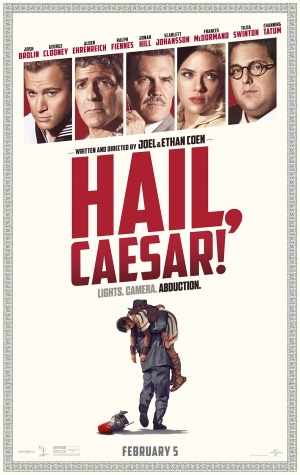
Hail, Caesar! has been the target of some rather blistering criticism, and to those who are familiar with their body of work, it doesn’t make much sense as to why that is. No Country for Old Men and True Grit were just as peculiar, yet both made their money back and then some (No Country earned $74 million while True Grit made an impressive $171 million). Moreover, people praised the movies for being thought provoking, exciting and, above all, for bringing that unique blend of oddity and charm that only the Coen brothers can provide.
But Hail, Caesar! hasn’t gotten a fraction of the love that these previous films got. Sure, it managed to make a profit, but people are giving it tons of crap, claiming that the movie was “disappointing,” a “glorious mess,” and that it, “lacked conviction.” Perhaps the most piercing comment came from the young lady who, as she and her date were making their way out of the theater, I heard say, “We just wasted two hours of our lives.”
Huh? What gives?
As I said, the movie is no more or less bonkers than any of their other movies, and yet people have clearly been let down. While someone who’s familiar with their work may say, “Well, what about Intolerable Cruelty and The Ladykillers? Neither of those were all that good.” True, but they also weren’t written solely by the Coens. I realize that may not fly for some, but personally, I consider their writing and directing to be at its best when they’re completely in charge of it. As such, we should turn to other reasons that may point to their apparent failure with their latest movie.
On the whole, there’s probably two reasons as to why this movie has performed so poorly. First and most obvious is that the Coens are… let’s just say, unique filmmakers who go to the moon and back when it comes to accurately telling the story they tell. When you watch their movies, you can love ’em or hate ’em, but you can’t deny that every single last detail in every single scene was planned out. They are that thorough. Of course, that also means that their movies can come as a disruption to more laid-back audience members. You watch a trailer for The Avengers or The Longest Ride and you can accurately predict what you’ll get when you see it. But there’s no telling what you’ll get when you watch a Coen brothers movie.
Just picture it; some fella watches a trailer for Burn After Reading thinking it’s just going to be a fun, goofy comedy starring Brad Pitt and George Clooney. He decides to see it and suddenly this happens. Or this. Or that. In the long run, things like this tend to turn off, or at least confuse viewers who thought they had a pretty good idea for what they were in for. Of course, folks who have come to enjoy the Coen’s antics are completely unfazed, or more likely, they tend to relish each quirk. But those who don’t have patience for that sort of thing probably won’t be forgiving any of it and won’t render the slightest bit of sympathy.
The second, and much more troublesome reason for the film’s apparent failure, is that even true-blue fans of the Coens took issue with it. The same person who called the movie a “glorious mess” said that he couldn’t believe the film had been made by the Coens, implying that he’s a fan of their other movies. In particular, he and other reviewers claim that the film was a bit of a swindle; they went in thinking it was going to be a goofy madcap movie starring George Clooney, but instead got a morality tale centered on Eddie Mannix (Josh Brolin) whose job it is to manage the lives of the various movie stars who work at the studio. They also took issue with the various cinematic set-pieces (e.g. Channing Tatum’s musical number and Scarlett Johansson’s aquatic extravaganza) in the movie which, while executed wonderfully, didn’t seem to have any point being in the movie (they did, but I’ll get to that later). On the whole, there just wasn’t anything to like because, as these folks claim, the movie had no meaning.
Taking all this into consideration, it seems that Hail, Caesar! was doomed from the outset. Not only did the Coens fail to attract folks who aren’t used to their oddball movies, they also failed to give their fans something to truly appreciate. There was, apparently, no one who could fully enjoy the movie, which undoubtedly accounts for the film’s underwhelming performance at the box-office and its lack of praise (it currently holds a 6.6 out of 10 on IMDb).
Frankly, the criticisms towards this movie have been unjust. Not only is it terrifically lighthearted, which made it refreshing in the sea of blood projected on screen by movies like The Revenant, The Hateful Eight, and Deadpool, it also proved to be much more thoughtful than all of them combined. Like any great parable, however, the meaning has to be searched for and excavated before it can be embraced; to do otherwise, which would mean taking the movie at face value, is to run the risk of finding it to be a flippant, nonsensical movie. I assure you, it is not.
A Mensch’s Gotta Do What A Mensch’s Gotta Do
If there is one underlying theme that tends to show up in every single Coen Brothers movie, it’s the idea that life is tough, and the greatest thing anyone can learn is to live as a mensch, which is to say a person with, “integrity and honor”. While there are certainly exceptions to this – Miller’s Crossing, Blood Simple, and The Man Who Wasn’t There all feature pretty despicable characters – there is no shortage of decent personas populating the Coen’s movies. Whether it’s Marge in Fargo, Norville in The Hudsucker Proxy, the Dude in The Big Lebowski, or Ed Bell in No Country for Old Men, the Coens undoubtedly have an appreciation for courage and grace. Moreover, if the job of the storyteller is to be honest about people’s faults while also inspiring them to better themselves, then the Coens have never failed to show both the rewards garnered by living decently and the punishments for living cruelly.
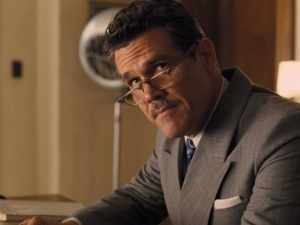
Eddie Mannix, the central character in Hail, Caesar!, carries on the tradition of presenting a character that sets aside his personal desires for the sake of others. At the start of the film, we see Eddie (who is actually based on real-life Hollywood “fixer” E.J. Mannix) has no shortage of crap to deal with at Capitol Pictures: there’s young, beautiful, up-and-coming starlet Gloria DeLamour (Natasha Bassett) who moonlights as a centerfold; there’s Laurence Lorenz (Ralph Fiennes) who is very peeved with the star of his new movie, Hobie Doyle (Alden Ehrenreich), for being a bit of a dipstick when it comes to reading his lines; there’s DeAnna Moran (Scarlett Johansson), a rather bitter diva-ish actress who is cynical about pretty much the whole of life after having gone through two divorces and two out of wedlock pregnancies; there’s Thora and Thessaly Thacker (Tilda Swinton), a pair of gossip columnists who are about as charming as listening to an orchestra play Beethoven’s 5th using just their nails and chalkboards; and, to top it all off, the biggest star at Capitol, Baird Whitlock (George Clooney), who is currently working on Capitol’s biggest movie Hail, Caesar!, has gone missing.
As said, no shortage of crap. And to make it even more piercing, it isn’t even Eddie’s crap. He is, actually, a pretty straight shooter in his life away from the studio. He’s faithful and loving to his wife while working with serial adulterers and fornicators; he loves his kids and works to be a part of their life; and at the end of the day, he genuinely wants to help out the folks he works for in spite of their crazy behavior. In fact, some of the best laughs in the movie come when he’s at confession. Here’s this guy who works day in and day out fixing other people’s problems, and yet he tells the priest that the worst thing he’d done all day was lie to his wife about smoking a cigarette. His confessions become so pervasive that even the priest has to tell him, “You’re not that bad.”
So on the whole, Eddie’s a good guy. Yet in spite of his dedication to others, he does at times become exhausted with having to clean up other people’s messes. He’s so exhausted that at several points during the movie he entertains the idea of quitting and moving to Lockheed, where he’s been offered an executive position where he can rake in as much, if not more, money than he’s been earning at Capitol and all without having to devote himself to repairing the lives of others.
That isn’t a bad deal by any stretch, and he’s understandably tempted into considering the deal. He runs it by his wife; she tells him that he should do the right thing. He’s not particularly sure what that means because he isn’t convinced that he is doing the right thing. Is helping fragile people come back together only to inevitably fall apart later really a good thing?
He takes it up with his priest. He tells him that he’s been offered a choice between living an easy life or doing the right thing. The priest, who is a man of few words anyways, simply says, “God wants us to do the right thing.” And that’s enough for Eddie. Hearing it from both his wife and his spiritual guide cinches the deal.
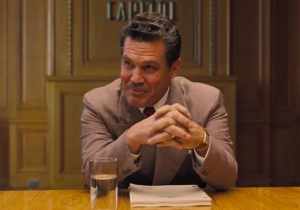
He goes back to work, rejects the Lockheed offer, and fixes everything. Ms. DeLamour stops posing in nudie mags, Lorenz manages to finish his movie, Doyle goes back to starring in movies that are better suited to him (Westerns), DeAnna marries the man whom Eddie introduced her to, Thora and Thessaly both end up with stories, and Baird is recovered and finishes Hail, Caesar! At the end of the day, Eddie finds that while what he does is tough, it is also meaningful, and serves to both help others and give his own life purpose.
That’s it. That’s the moral of the story.
I’m not making fun of the movie for having a simple message. If anything, I’m utterly perplexed as to how audience members can claim that they don’t get the movie. How can the message be missed? Even for those who aren’t religious, the idea of doing the right thing over that which would simply allow us to glide through life should still ring true, right? It’d be easy to chalk up the audience’s misunderstanding, or flat out lack of understanding, to cynicism, which is to say that some folks are too brittle to appreciate a lighthearted story. That, however, is far too flimsy an explanation especially seeing as how audiences tend to see movies that provide escapes from the harshness of life (Spotlight and The Revenant were the Oscar heavyweights last year; audiences, however, preferred Star Wars: The Force Awakens and Jurassic World).
The only other possible explanation that comes to mind is that the movie does have two seemingly useless elements; the first is the collection of scenes that celebrate the Golden Age of Hollywood. The second is the situation which revolves around Whitlock’s kidnapping. To read some of the nastier detractors complain about this movie, one would assume that if these two things were absent, then Hail, Caesar! would go from being stupid to decent. If anything, these two elements are what make the movie go from decent to great.
What You See Isn’t What You Get
How many of us have been brokenhearted to hear about a scandal that completely, sometimes even irreparably, tarnished the image of a celebrity that we thought was probably a decent person? You’ve seen their movies and maybe watched an interview or two with them, and you always thought, “You know, it’d be kind of cool to sit down and chat with them.” And then wham! You see them on the front cover of People or US Weekly or some other scandal rag revealing their inner demons. Whether it was Philip Seymour Hoffman’s drug addiction, Miley Cyrus’ oversexed tomfoolery, or Jeffery Jones’ repulsive attraction to teenage boys, it seems that more often than not, the nice, baby-face, sometimes flat-out charming personas that people portray on screen are the complete antithesis of who they are in real life.
And yet, there was a time when actors did their best to inspire people to do the best they could and therefore tried to ensure that there was a measure of integrity both in the roles they played and in their private lives. Sidney Poitier reportedly claimed that once he became a solid actor, he swore off villainous roles. Similarly, James Stewart said that he could never see himself, “playing a heavy,” because he’d so thoroughly cultivated a wholesome image that people looked up to. This attempt to live as honestly as one can, even within the realm of fiction, is another facet of Hail, Caesar!

The four movie stars that Eddie manages – DeAnna, Hobie, Baird, and the heretofore unmentioned Burt Gurney (Channing Tatum) – all have their own screen personas and, ironically, they tend to be the complete opposite of that persona. DeAnna is made out to be this luxurious princess, all smiles all the time. That is of course until she starts cussing out the crew for forcing her to wear such uncomfortable costumes. In a gesture of extreme petulance, she even belts the conductor of the orchestra with her tiara on account of how annoyed she is. There is also the case of her two children, both of whom were born out of wedlock, and who have no father figure to grow up with. All in all, she’s about as far from a princess as you can possibly get.
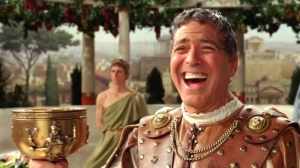
Baird is the Cary Grant of Capitol Pictures. He’s the strong, towering figure that exudes calm fortitude in the face of any obstacle. You can always count on him. Or, more accurately, you can always count on his typecast characters. In truth, the man is a complete and utter pushover. For the first half of the movie, he gets indoctrinated by a pack of Communists (his kidnappers), and like the airhead he is, totally buys what they’re peddling. But the second he starts spouting their nonsense in front of Eddie, he gets slapped upside the head and told to drop the act and get back to work, which he does. Again, far from being a thoughtful, courageous gent, he’s just a twerp who does what other people tell him.

Undoubtedly the worst is Burt. This fellow is a cross between James Stewart and Frank Astaire; the all-American, tap-dancin’, “hey buddy, how ya doin'” guy. The entire time we see him on set, he exudes goodness of every kind. He’s clearly a skilled dancer and singer who’s devoted to his craft. He’s friendly, courteous (he’s one of only two characters to refer to Eddie as “Mr. Mannix”) and no one has a bad thing to say about him. If only they knew that he is in league with the same Communists who kidnapped Baird. Actually, one could make the case that he was the one who arranged the kidnapping in the first place since he was the only one of the group who knew Baird on a personal basis. At the end of the day, he gets away with his crime by defecting to the Soviet Union and taking a one-way submarine ride to Moscow.
On the whole, Capitol clearly has its share of oddballs (and that’s not even counting the pretentious director Lorenz and the kooky studio editor C.C. Calhoun). But ultimately, there is another decent guy at Capitol, one with the same appreciation for honesty that Eddie has; Hobie.

Hobie is the goofy guy who everyone thinks is just some dumb hick who only knows how to ride horses, shoot prop pistols, and sing ballads. In the opinion of the studio execs, the guy is such a nincompoop, that they feel obligated to beef up his image and make him appear more intellectual by casting him in the posh soap-drama Merrily We Dance. And guess what? He stinks. The guy can’t even say the simplest line with ease.
As such, Eddie lets him go back to playing the kind of roles that reflect who he really is; a humble, kind-hearted, polite guy (he’s the second of the two characters to refer to Eddie as “Mr. Mannix” and the only one who actually means it with a measure of respect). In spite of the derision, however, Hobie is ultimately the one who uncovers the Communist plot and rescues Baird. Him, of all people. Not DeAnna, definitely not Burt, not even the shrewd, usually vigilant Eddie Mannix. No, at the end of the day, it was the guy who no one thought anything of who ended up keeping Capitol from sinking. And why might that be? It’s because in spite of his inability to say, “Would that it were so simple,” he at least knows when it’s necessary to right wrongs, and that’s something that none of the other stars know how to do. That’s why the only actor in the movie who can claim to not need Eddie’s help is Hobie.
This brings to mind a verse from 1 Samuel 16:7; “People look at the outward appearance, but the Lord looks at the heart.” In other words, don’t judge an actor by the roles he plays. That is, in essence, the complimentary message of the movie. Eddie wants to do what’s right, and in keeping with that ideal, he wants to make movies that showcase the best in people. But he can’t do that if he doesn’t inspire goodness in the actors themselves. Sure, their characters might be good, but of what worth is it in the end if they themselves aren’t good, or to put it another way, if they themselves don’t learn the lesson the movie is teaching. As such, he finds it necessary to inspire his actors to do the best they can, both on and off the screen. As such, he does all he can to make sure they can find a measure of goodness in life; he finds DeAnna a husband willing to claim her kids as his own, he allows Hobie to go back to his beloved Westerns, and even after smacking some sense into Baird, tells him to, “be a star.”
Now, it’d be impossible to ask anyone to be a good person all the time. We are all, as Immanuel Kant once said, fashioned from the crooked timber of humanity, and therefore will always be susceptible to the foibles that come with being human. And in the realm of movies, someone will always have to play the bad guy if there are to be any stakes (even kids know that in order to play cops and robbers someone has to be the robber). But that doesn’t mean people can’t work towards being a decent person both in and out of their private lives. Of course, such a decision is up to each person to decide for themselves, but as evidenced by the movie, the only folks who tend to really get things done and live upright lives are those who have a respect – even if it’s begrudging – for moral consistency.
Marx Me Down As Confused
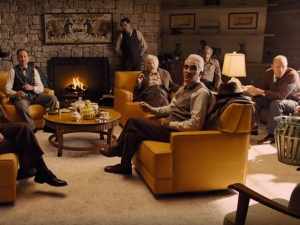
So the central narrative of Hail, Caesar! has a point, as do the cinematic interludes focusing on Capitol’s stars. But what about the Communist cell; what exactly do they have to do with anything? This, admittedly, is probably the trickiest part of the movie to comprehend seeing as how one could say that the Communists (who call themselves “The Future”, presumably after the journalist Lincoln Steffens’ ridiculous claim that, after he’d visited the Soviet Union, he’d, “seen the future and it worked.”) were there just because the movie needed villainous characters. They served no purpose other than to give Eddie an obstacle on the way to saving Baird and finishing Hail, Caesar! Upon reflection, though, The Future is also an integral part of the story, and they’re not just run-of-the-mill bad guys.
First off, their presence in the movie helped to flush out the era. At the time, there were a number of Communist sympathizers, not to mention pure blooded Communists, in Hollywood. Directors Abraham Polonsky and Edward Dmytryk, as well as screenwriter Dalton Trumbo all had ties to Communist sects that existed in Hollywood from the ’30s to the ’60s. In this sense, they serve to add some historical flavor to the movie.
But more importantly, The Future truly act out their role as the movie’s antagonists, and not just because they are kidnappers, but because they are what cause the moral friction in the movie through their indoctrination of Baird.
Within moments of being introduced to the members of The Future, Baird (as well as the audience) can tell that these guys are a really peculiar bunch. They speak only in far-fetched, bizarre philosophical themes, quoting Karl Marx, Friedrich Engels, and Vlad Lenin whenever they get the chance. Also, there’s no sense of camaraderie about them; they’re always shouting at one another and never refer to one another by name (even on IMDb, the actors are simply listed as Communist #1, Communist #2, etc.). The only one of the group who’s referred to by name is Professor Marcuse (John Bluthal), a distinguished member of the Frankfurt School (and, by the way, another historical figure).
It’s important to remember that Baird is about as smart as a 2×4, so he’s basically just soaking in all of their garbage. He never questions what they’re saying, and even at times tries to show them that he’s “understood” their lessons. Eventually Burt returns to their hideout with Baird’s ransom (the irony of selling Baird’s well-being for $10,000 is completely lost on them) and they bow out, simply leaving him to be rescued by Hobie.
When he returns to Capitol, the first thing he says to Eddie, the man who helped amass the sum necessary to free him, is that there’s no worth in what they do, implying that Baird was just as well off staying kidnapped than being rescued. Since he’s come to believe that actors, directors and writers are just kidding themselves into thinking that they are making something of value, there’s no point in making movies because they are nothing more than”bread and circuses” for the people. To top it all off, he claims that movies have no “spiritual dimension.” It’s in that moment that Baird receives a reality check courtesy the back of Eddie’s hand, who then reminds him that without Capitol he wouldn’t have a job and thus no means to provide for himself. Baird is wise enough to see the sense in getting back to work, and does so post-haste.
Again, far from being just a mindless gang of hoods who wanted to make an easy 10-grand, The Future wanted to destroy the idea that movies, one of the most beloved forms of storytelling, have value. Their motives boiled down to thinking that filmmakers are swindlers who con the mindless masses into gobbling up their useless, forgetful product. This is absolutely false, and it’s obvious to anyone who has seen a TV commercial or looked at a billboard.
The popular culture is filled to the brim with cinematic images. I bet you anything that if you ask 100 people what movie “the Force” is from, 99 of them will immediately say Star Wars and 1 will say, “Star Trek. Oh, no wait, my mistake. Star Wars.” If you go into any kids clothing store, you will see shirts adorned with the newest Disney hero/princess (shoot, at the local Wal-Mart, Elsa is still the queen of the kids apparel).
But the effect of the popular culture goes far beyond merchandising. Both good and bad movements have started on account of movies precisely because they are able to reach millions of people. Steven Spielberg received the Presidential Medal of Freedom, the highest award that could be bestowed upon a civilian in the United States, for Saving Private Ryan, which honored the valiance of our nation’s soldiers so that a new generation could learn to appreciate their sacrifices. While it’s a TV program, HBO’s The Wire is now required viewing in some political science courses. And most ironic of all, the Communist movement was in large part spurred on by propaganda films from Soviet directors like Sergei Eisenstein and Vsevolod Pudovkin.
In a way, The Future is perhaps one of the most insidious group of villains to be portrayed in recent memory precisely because the things they attack are what make us human. Sure, they aren’t a band of savages like the War Boys in Mad Max who only want to butcher people, but they didn’t have to be. Ironically (again), although they are materialists, they decided to go after ideas that they disagreed with and thought would only serve to harm people. As such, they didn’t just kidnap Baird for the money; they kidnapped him in the hopes of turning him into a nihilistic automaton that would dismantle the studio he worked for by leaving it.

But in the end, their ideas blow away in a matter of seconds when they encounter reality as they are dealt a one-two punch. First, Baird goes back to work and finishes the Biblical epic Hail, Caesar! at Capitol Pictures. And second, the money they were going to use to further their reach and build up their cell ends up at the bottom of the Pacific Ocean after a mishap involving a Soviet submarine, a rowboat, Burt, and a puppy (like I said, this is a Coen brothers movie). $10,000 gone like that. So much for The Future.
“A truth we could see if we had but…”
In his Great Movies essay for The Big Lebowski, Roger Ebert said, “‘The Big Lebowski’ is about an attitude, not a story.” I agree wholeheartedly, but that observation should be applied to all their movies. When all is said and done, their movies have the simplest set ups imaginable. In fact, I think that most of them could be summed up in about one sentence. Fargo is about a police officer tracking down some killer thieves. A Serious Man is a contemporary retelling of the Book of Job. Inside Llewyn Davis is about a folk singer trying to make it big. Like the most dazzling of storytellers, the Coens realize that it’s not about the set-up for the story, which amounts to little more than cosmetics, but rather how the characters deal with the set-up.
What is the greatest criticism leveled at filmmakers nowadays? It’s that they only care about frying the senses rather than invigorating the imagination. Comedies nowadays only care about the set-ups and have zilch to show in terms of character development. It’s all about how much they can gross out the audience and how many times the characters can drop the f-bomb in a minute. Horror films are all about sex and blood and screaming (typically in that order) and how many times the characters can drop the f-bomb in a minute. And action movies are about how many square inches of the screen can be filled up with explosions and how many times the characters can drop the f-bomb in a minute. Yet it’s these mindless, superficial movies that try fruitlessly to captivate the audience and make them think like they’re actually saying something important.
Don Jon was called “stellar” by Rolling Stone’s Peter Travers, “genuine” by Peter Debruge at Variety, and an “examination of modern love” by Annlee Ellingson at Paste Magazine. It marketed itself as an edgy romantic comedy/drama about a man addicted to porn (Joseph Gordon-Levitt) who has to find a way to navigate the world of real relationships. Sounds intriguing at first, but then you see it and realize it’s just a mindless collection of sex scenes interspersed with clips from actual porno videos (how this movie wasn’t rated NC-17 is beyond me), really bad Jersey accents, and surprisingly unfunny dialogue that is topped off by the exceedingly creepy fact that Levitt’s character ends up dating (or at least sleeping with) a woman who’s about 20 years his senior.
The Purge sounded like a really neat movie. What would it be like if one day out of the year all crime was legal for about 12 hours? The sky is the limit with this sort of story… oh no, wait. It’s just about people getting shot, stabbed, beaten, immolated, curb-stomped, and tortured both physically and psychologically. So much for potential.
And what about those delightful Transformers movies. Each new entry adds to the already convoluted mess of the Transformers-mythos with talk about the All-Spark, the Fallen, the Ark, and so on and so on to cover up the fact that the movie has nothing to say about anything. The movies could sincerely be forgiven if they were 90 minute action extravaganzas which were only about robots beating each other up. For goodness’ sake, Guillermo del Toro did that with Pacific Rim and that movie was a blast and a half. But no, the filmmakers behind the Transformers movies have to stretch the movie out to ungodly lengths (the most recent film, Transformers: Age of Extinction, was 165 minutes long) to pretend like their movie actually has meaning. One is tempted to say that at the end of the day, these movies don’t matter because everyone makes fun of them anyways. That is until one looks at the box office take for the entire series: $1.3 billion domestically and $3.7 billion worldwide. Clearly there’s a handful of folks who like them, and given how popular these movies have been, there will undoubtedly be another movie.
And yet Hail, Caesar!, the humble little comedy which is genuinely thoughtful, is lambasted because… actually, I have no idea why it’s been so lambasted. It’s well written, the comedy is pristine, the acting is hysterical and charmingly peculiar, and above all, the filmmakers are unashamed to show that there’s a message at the core of the movie. Even still, there are some people who think it’s a “waste” of two hours.
Now, if you liked all the previously mentioned films, that’s fine. If at the end of this reading you still hate Hail, Caesar!, that’s fine. But to my mind, people aren’t just disliking this movie; they’re not even giving it a chance. The insights in this piece aren’t locked away in some vault, nor are they fanciful interpretations. It’s all right there on the screen for everyone to see. One need only look for it.

At the end of the movie, Baird delivers a speech at the feet of the crucified body of Christ, and as he looks at His shattered remains, he realizes that He represented, “a truth we could see if we had but…” He forgets the last word in the speech. He looks at the director who angrily shouts, “Faith!”
Seeing all the criticism the movie has received and how mangled it’s been, I can’t help but want to shout the same thing.
What do you think? Leave a comment.










Excellent work on this one! I’ll definitely have to check out Hail, Caesar!
Emily,
Thanks for the kind words. I hope you check it out and enjoy it.
-August
The film is more “hard work” than the trailers suggest – hence the disappointment. And while I’m on quite shaky ground on my own interpretation of it, any film which takes a light hearted look at representations of the opiates of the masses (initially religion, latterly politics) and how those representations are products of the battle between the two, has got to be worth the price of admission.
Jarred,
It’s certainly a Coen brothers movie inasmuch as it doesn’t take itself to seriously while also providing serious messages. Thanks for the comment.
-August
I thought it was really funny! I particularly liked the long shot of the number ‘aint gonna see no dames’, and the clip of the movie ‘lazy ole’ moon’. Something about it tickled my funny bone and I was chuckling away!
Golden,
Both those scenes were really cheeky, for sure. Thanks for the comment.
-August
I had a massive smile on my face from start to finish with genuine laughs throughout. Their affection for the old movies shines through and it was just so much fun.
Jimmy,
That’s for sure. I think I read somewhere that the Coens were really indoors-y kids who would watch old movies all the time when not at school. One certainly wonders if that didn’t color their filmmaking style. Thanks for the comment.
-August
You really have to like old Hollywood movies to get a lot of the jokes – not many were laughing in the cinema where I saw it – as there’s not much holding the various set-pieces together. It’s more like a long sketch show than anything else.
Discotek,
It’s not just old Hollywood movies, it’s also the way old Hollywood functioned. Nowadays movie stars have PR reps, agents, and managers, but back in the day, all those jobs were basically held by a guy in Eddie’s position. As such, it make sense that he’d be so worn by the job. Thanks for the comment.
-August
For everything there is an opposite – several scenes had the trendy north London audience howling with laughter at the performance we attended. I studied 40s Hollywood at Warwick in the 70s and really didn’t feel that the references were especially laboured – they’re there if you want ’em, but it ‘s perfectly enjoyable if you don’t. It’s a film of set pieces – I don’t think it warrants the search for logic or versimilitude, to be frank. No accident, on this count, that the script writer’s guild, “The Future”, are comic figures in the film.
This is a GREAT breakdown of this film. It has been getting the widest range of reviews I can remember.
Uake,
Thanks for the kind words.
-August
It’s Fargo without the blood, done by Busby Berkeley. Lovely.
Matson,
It certainly is; great description! Thanks for the comment.
-August
Tepid and dull. Well acted and shot of course but the ‘script’ was all over the place.
gemz,
I’m not entirely sure what you mean by the script being all over the place. If you mean that there were many different set pieces, then yes, absolutely it was all over the place. But if you mean the story was incoherent, then I don’t think that’s the case at all. The film is, more or less, a day in the life of Eddie Mannix, and as such has to show him dealing with all the problems listed in the article.
While I can understand people finding The Future storyline a bit strange, it is by no means a useless plot point. If you’d like, I’d be more than happy to hear what makes you think the movie was all over the place.
Thanks for the comment,
August
It’s clean and snazzy and snappy and sassy, but it almost feels a bit too arch as well as being a bit, well, shallow. glad to have seen it but won’t be rushing to watch again somehow.
grant,
Sure, some movies are a one and done kind of deal, but I also wouldn’t say that it was shallow and I also wouldn’t say the movie’s merit lies solely in it’s wonderful recreation of classic Hollywood. To my mind, there was a whole lot more there than a lot of people give it credit for.
Thanks for the comment,
August
I thought it was brilliant. Maybe a bit like a live action Family Guy but what’s wrong with that?
Batts,
I think Seth MacFarlane is a bit more irreverent than the Coens, but shoot, if that’s the way you see it, that’s fine.
Thanks for the comment,
August
What this film lacks is, like, the rug that ties the room together. Or maybe there are too many of them on too many levels. It’s about Hollywood and communism and capitalism and religion and about work and careers and gays and acting and being yourself and what is more important and whatever.
So it is not a masterpiece as some Coen works are, or at least not immediately recognizable as whatever it may be but it still is full of too much great stuff to just ignore it. It does not gel somehow, but it is still worth every minute you will be watching it.
Rohr,
I think if a person were to criticize this movie, then your “too many rugs in the same room” metaphor would be much more appropriate. While I think the movie did cohere, I can understand why someone would say that they thought there was too much going on, which I think can be said about many of the Coen’s movies. For example, The Big Lebowski, to put the plot-points in list format, is about sportsmanship, camaraderie, nihilists, pornographers, bizarre artists, adultery, and scams.
Frankly, I think that the only defense I can offer to someone who says that Hail, Caesar! is mediocre because it does too many things at once is to paraphrase Ebert; it’s not about what happens but about how the characters deal with it.
Thanks for the comment,
August
Why do so many directors make films about making movies? Talk about slaves to realism.
Reddick,
Beats me. While Hail, Caesar! isn’t about making films but rather the people who make films, and more importantly, what that means to them, there are still a lot of shows/movies out there about making movies, which is a bit odd.
Thanks for the comment,
August
It was a weird film. I was greatly looking forward to it based on the directors and stars, but it didn’t quite come together properly.
It was like half comedy and half drama, but you weren’t quite sure what you were watching, apart from being a homage/ critique of 1950’s Hollywood. And the communist sub plot didn’t really work either.
Strangely both Clooney and Johansson’s roles seemed underwritten or slightly miscast. It was good, but it’s no Fargo or No Country for Old Men.
Stark,
I can only say that for me everything did come together, though as I said to Rohr, if there is any one critique that I think really could be argued for, it would be that there was too much going on in the movie.
I thought Clooney was fine; Johansson’s character, while not as tightly written as some of the others, worked fine for me because she’s a glitzy actress playing a glitzy actress (though, as you said, the character could’ve been a bit more flushed out).
Lastly, the Coens have undoubtedly made better movies (Fargo, The Big Lebowski, and True Grit), but I also don’t think that Hail, Caesar is by any means their worst movie or even a bad movie; it’s a truly pleasant movie that I found to be as good as anything they’ve made.
Thanks for the comment,
August
Yes the plot doesn’t go anywhere – it’s not supposed to! It’s a movie of ideas, and laughs, and beautifully shot and acted to boot! And Alden Ehren-whats-his-name is brilliant: we’re going to be seeing a lot more of him.
Leopoldo,
That’s about where I stand on the whole thing, and even then there is a coherence to the ideas. It’s not just a bunch of random thoughts splattered on a screen, but a lucid examination of moral thoughts and actions.
Thanks for the comment,
August
For me, it’s probably the most disappointing film of the year so far. I wouldn’t watch it again.
Burrow,
That’s a shame. What about the movie didn’t cut it?
Thanks for the comment,
August
Coen brothers are too clever for their own good sometimes, this was painful.
ORTA,
That’s funny; to me they’ve never come off as too clever. Some directors are (like Wes Anderson and Paul Thomas Anderson; for me they’re at their best when they restrain the style’s they’ve come to be known for), but frankly, the Coens always know how to measure themselves.
Thanks for the comment,
August
I loved it and will rewatch.
DIllon,
Good deal. Thanks for the comment.
-August
The Coens tend to alternate great films with stiffs, but this is hilarious and engrossing, despite the colander of a plot. The sequence between Hobie and Laurentz is destined for classic status. Too many filmic references to enumerate, but the stuttering Roman has to be an hommage to Life of Brian, surely? Impossible to make a film about ancient Rome without thinking of the latter – “stwike him roughly, centwurian!”.
Seal,
It’s good that you liked it, and you’r absolutely right about the scene between Hobie and Laurentz; while it may not be classic in the same way that Terry Malloy’s monologue in “On the Waterfront” is, it is without a doubt one of the funniest moments in any Coen movie.
Thanks for the comment,
August
I loved the “Hail, Caesar!” from beginning to end. Any film which manages to weave together lessons about morality and faith and still provide moments of high comedy is a winner in my books. The Coens’ films have always displayed their love of movies in one way or another, but in none of their previous films has it been quite as evident as it is here.
It probably helps to have a good background in classic film before you go to see this film. When I saw it I was in a theater filled with mostly twenty- and thirty-somethings like myself, and I was the only person in the room who laughed at the reference to Norman Taurog and the mention of the ‘Wallace Beery Conference Room’. A lot of the references would just go over your head completely if you don’t know a lot about old movies, and that’s where most of the humor in the film came from. So in that sense I can understand why some people were disappointed in it.
John,
That’s a good point as well, and one that I should’ve mentioned in the article. Hail, Caesar! is filled with a lot of “insider” jokes which understandably aren’t understood by folks who haven’t watched older movies.
Thanks for the comment,
August
This is a decent little film, with a few good lines (the elocution scene and the various religious leaders debating the merits of the film-in-a-film being the standouts). Nothing wrong with that. Pleasant, painless and it has its moments.
EthanHawk,
While I thought there was more to the movie, it’s good to know that there are some folks who at least enjoy it for being a pleasant little movie. And you’re right about the meeting with the religious leaders; that bit was hysterical.
Thanks for the comment,
August
Hilarious film, funniest things I’ve seen in years. If you like movies from the 50’s then you will love this pastiche. I was literally crying and hiding my face as I was laughing so much.
Nothing complex, pleasant throughout just funny!
Cho,
That’s good to hear. I’m glad you enjoyed it.
Thanks for the comment,
August
It’s light and fluffy, which is a welcome antidote to many other movies around at the moment.
Cordero,
I agree completely. Thanks for the comment.
-August
I absolutely loved watching all of the old musicals when I was growing up – Singin’ in the Rain, Seven Brides for Seven Brothers, American in Paris – the list goes on and on. The Coen brothers are always inspired!
Preston,
It’d be neat to hear from them what musicals in particular inspired them. Thanks for the comment.
-August
I’m not normally a fan of the Coen brothers. I wouldn’t seek out one of their films just because of their name, so I’m probably not the target audience here. However I quite enjoyed this – each segment worked – some were funny, some were merely enjoyable, and Channing Tatum’s dance number was so different to the rest that it felt like an interlude.
C.K.
It’s good that you found some fun elements in the movie so it wasn’t a total waste.
Thanks for the comment,
August
This film was absolutely terrible. Nothing really happens (which isn’t always a criticism; the Coens’ A Serious Man was great with barely a plot) and each segment feels too fluffy, light & insubstantial like candy floss. A brilliant cast is wasted; everyone’s spread too thinly to truly stand out.
The film remind me of Inherent Vice for its rambling stretches of nothingness punctuated by ‘zany’ humour.
Chisolm,
It’s funny, I agree completely when it comes to Inherent Vice, but for me Hail, Caesar! manages to stay fun and engaging all the way through. I think this is due to two reasons: first, Hail, Caesar! is an hour-plus shorter than Inherent Vice. Secondly though is that while there were many characters in Hail, Caesar!, they were all given the time that they deserved. In Inherent Vice, characters who I thought needed more screen time (e.g. Eric Roberts’ character, Jena Malone’s character, Owen Wilson’s character) were just there and gone. Also, Inherent Vice was odd but not in any sort of endearing way; Hail, Caesar! at least was memorable to me and it’s weirdness was funny.
Thanks for the comment,
August
Saw it last night and loved it. Sometimes very silly but with some very clever observations and a great cast!
Reagan,
I’m glad you enjoyed it. Thanks for the comment.
-August
Light entertainment and not up to the Coen standard. Disappointing. Sorry.
Cruz,
Don’t be sorry. I enjoyed it, but it doesn’t mean you have to be sorry.
Thanks for the comment,
August
I adored Hail Caesar! Your article is well written and I appreciate your points! Its nice to see Hail Caesar get some of the love it deserves!
sophiacatherine,
Thank you for the kind words. I’m glad you enjoyed the movie.
-August
One of my favorite movies of the year. I really enjoyed your piece on it!
Kathleen,
I appreciate your kind words, and I’m glad you enjoyed the movie.
-August
What an excellent and thorough review of what sounds like a charming movie. I saw the trailer for it awhile ago and thought it looked fun but then sort of forgot about it – had no idea about the negative reviews! Fortunately I never let reviews decide anything for me. Your review, though, gives me some clear incentives to go see it, so thank you!
natalieanne,
I appreciate your kind words and I hope that you enjoy the movie.
-August
The problem with Hail Caesar! is best summed up as, ‘not funny’. The Coens are at their best when they deal within the darkness of life (Blood Simple, No Country For Old Men, A Serious Man). When they try to go for the easy laughs as in Hail Caesar! it just doesn’t work. I think it was DeMille who said if you want to send a message call Western Union, otherwise stick to doing something that will entertain. Many directors have subverted this notion and successfully ‘sent a message’ and entertained but the Coens missed it it with Hail Caesar!
ptoro,
That’s a wonderful line by DeMille; thanks for bringing it up. I still hold that the Coens made a very funny and thoughtful movie, but I’ll agree that it wasn’t a pure comedy like The World’s End or The Apartment. While I wouldn’t call it a problem (frankly, I think it’s one of the best things about their movies), I do concede that the Coens have a very unorthodox sense of humor that can seem bizarre and pointless to some folks. I don’t begrudge them thinking that; shoot, I actually agree with that summation. The only difference is in taste; I like it, others don’t.
I appreciate your comment.
-August
Do movies absolutely need to have a meaning behind them in order to be appreciated and successful? I mean, yes, stories can be a good way of teaching in addition to the combination of visuals and sound in film which can be a very powerful way to tell them. Heightful Height, as mentioned in the article, may not have a true meaning as a movie but is an example of one that can simply be meant to entertain with great dialogue and grand moments of violence and should still have the respect of a movie that may make you scratch your head about something.
Bthomae,
By no means do movies have to have the kind of meaning or message that Hail, Caesar! has in order to be successful, or for that matter, good. The two films I mentioned in the article (The Hateful Eight and Mad Max: Fury Road) are fine movies in their own right and extremely entertaining. With that said, though, they don’t have much going for them in terms of sticking with me.
Sure, I might remember some of the crazy action sequences from Mad Max or some of the great dialogue from Tarantino’s movie, but in terms of what the movie made me think and feel, in essence how it engaged me, I’ll have a much better time remembering how Hail, Caesar! did it than those other two.
It’s the reason why I sometimes catch myself thinking about a movie like Gattaca instead of movie like Air Force One; both are well made, but while the latter only entertained me, the former completely engaged me.
I appreciate your comment,
August
beautifully written……thank you so much….the garbage that passes for a ‘successful’ movie nowadays is disheartening at best and frightening at worst…if this is what our modern society yearns for, it is truly a sad commentary on our human condition…I liked ‘Hail Caesar’ in the movie theatre(but it was an awful theatre)…. but have watched it many times since and now am completely smitten with it….Alden Ehrenreich will indeed be a new star..thanks to the foresight of Spielberg and Coppola….I wish him luck…the movie is, as you say, a lovely, complex parable, satire, tale..thanks
Steven,
Thank you very much for your kind words. I’m glad you enjoyed the movie.
-August
“Hail Caesar” is the only Coen movie I have ever watched (just yesterday) and I was totally enthralled with every aspect of it! I grew up with the movies of the Golden Era. My heart and soul is filled with gratitude for this treasured gift! I sincerely mourn for those who have no understanding or appreciation of its value. It saddens me deeply; the awareness of what too many moviegoers feed on. A tragic commentary on the destructive road society, in general, has taken, I believe. I hope and pray the Coen brothers will be inspired by their worthy dreams and not discouraged by the numbed masses. Thank you, August, for sharing your thoughts and insight!
Crya,
Thank you for your kind words; I’m happy to hear that you enjoyed the movie.
-August
The overall article was nice. The only thing that bothered me is that the dancer that you referenced is called Fred Astaire, not Frank.